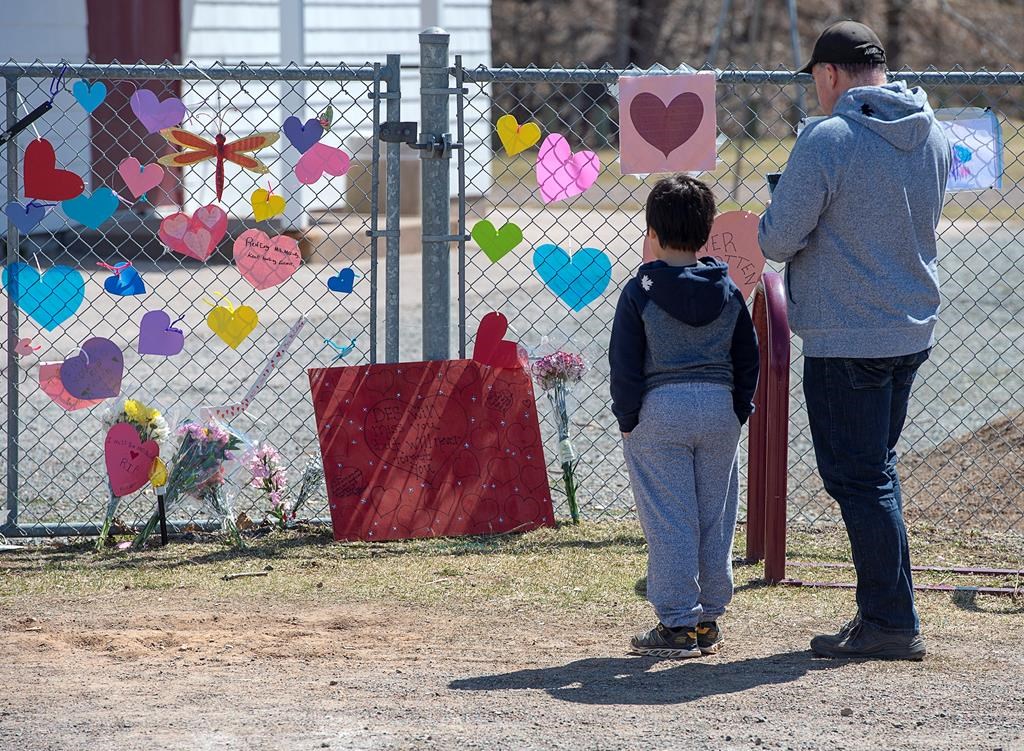Schools in central Nova Scotia have been in crisis management since a tragic event unfolded one year ago. Officials say the mental health of staff and students has been a priority year-round.

As the anniversary of the mass shooting approaches, those responding to students in need say ongoing support is more important than commemorating the anniversary.
Robert Graham, director for Mental Health and Addictions in the northern zone, says right after the tragedy, the department began working on supporting students from communities that have been impacted.
He said it’s also important for parents to know they play an important role in this process.
“Their children may have questions and concerns, and we want to be able to provide information to families, to be able to say it’s OK to respond to those.”
- Train goes up in flames while rolling through London, Ont. Here’s what we know
- Budget 2024 failed to spark ‘political reboot’ for Liberals, polling suggests
- Wrong remains sent to ‘exhausted’ Canadian family after death on Cuba vacation
- Peel police chief met Sri Lankan officer a court says ‘participated’ in torture
Aaron Callaghan, director of programs and student services at Chignecto Central Regional Centre for Education, says schools were already engaging in crisis management because of the pandemic when the shooting happened, but those efforts were ramped up.
“There was really a call on all schools and all regions to focus on trauma-informed practices,” Callaghan said.
According to Callaghan, mental health teams and school staff collaborated on identifying how trauma presents itself in different age groups, and why students may be traumatized.
“Trauma is very prevalent in our schools, more so I think, since the pandemic,” he said.

He said schools also focused on resilience, coping strategies and general well-being.
For example, Callaghan says one lower elementary school is working on mindfulness with its students. “There’s a great strategy for coping, and kids need to self-regulate,” he said.
“I know up through the grade levels, we have schools this year that have had an opportunity to focus on breathing exercises or yoga as a means to help regulate. So it has really looked different in different schools.”
But, he said engaging in conversations remains a priority.
According to Graham, Mental Health and Addictions has made several actions to support school communities throughout the year. This includes webinars for tips on talking to youth about tragedy.
Graham said they hold meetings with mental health staff that work in schools, as well as different student service teams, to ensure students in impacted communities are supported.
“I think the important piece for us was to be ready if people were needing something … that we have people ready to respond and feeling comfortable in responding to students’ needs.”
Graham said schools have noticed an uptick in the need for support services in the last year, and a part of that is efforts to normalizing reaching out for support.

As the anniversary of the tragedy approaches, Graham said there could be more people reaching out in need of support. But, the department has advised schools to not highlight the anniversary through any specific memorials.
Graham said research has shown that could have a negative impact on students.
“Having things on-site at schools, when they weren’t the site of the events, can actually be quite traumatizing for children and youth,” he said. “And when things happen in a school environment, it’s more difficult for students to stay if they don’t want to take part in that. So we don’t want to put children and youth in a situation where they’re feeling like they have to opt into something that maybe they’re just not comfortable with.”
According to Callaghan, consultations with Mental Health, the IWK and other partners have informed the education centre’s decision to not commemorate the anniversary.
“It’s really trying to make decisions that we feel are in the best interests of all our students,” he said.
“We can lean on what we’ve done all year and talk about those that social-emotional learning that that’s happening throughout the year.“
He says there’s been more dialogue on preparedness to provide more support to students, particularly in the Truro area.
One of the victims of the shooting was 49-year-old Lisa McCully, a teacher at Debert Elementary School.
Callaghan said schools that have been impacted the most will have additional staff on-site in the next few weeks.
According to Graham, the COVID-19 pandemic has impacted mental health services, especially when it came to coping with the tragedy.
“It really changed a lot of how we’re interacting with each other and some of those natural ways that we used to come together as a group,” he said.
“It’s more looking for those smaller, quiet moments to spend with people and really reminding them to rely on their friends and emotional support structures that they might have in place.”
He said he wants people to know that a lot of care and thought went into identifying what support may be needed and that their team is ready to provide that support.
In the days leading up to the anniversary, mental health staff are doing few more check-ins with the teams to see how everyone is doing.
“We know that this is also a difficult time for our own staff,” said Graham.
But, he says he wants to remind people that mental health support is a year-round effort, and is not focused on one time of the year.
Anyone experiencing a mental health crisis is encouraged to use the following resources:
- Mental Health & Addictions Provincial Crisis Line: 1-888-429-8167
- Kids Help Phone: 1-800-668-6868 (toll-free) Available 24/7 or Text CONNECT 686868
- Emergency: 911






Comments